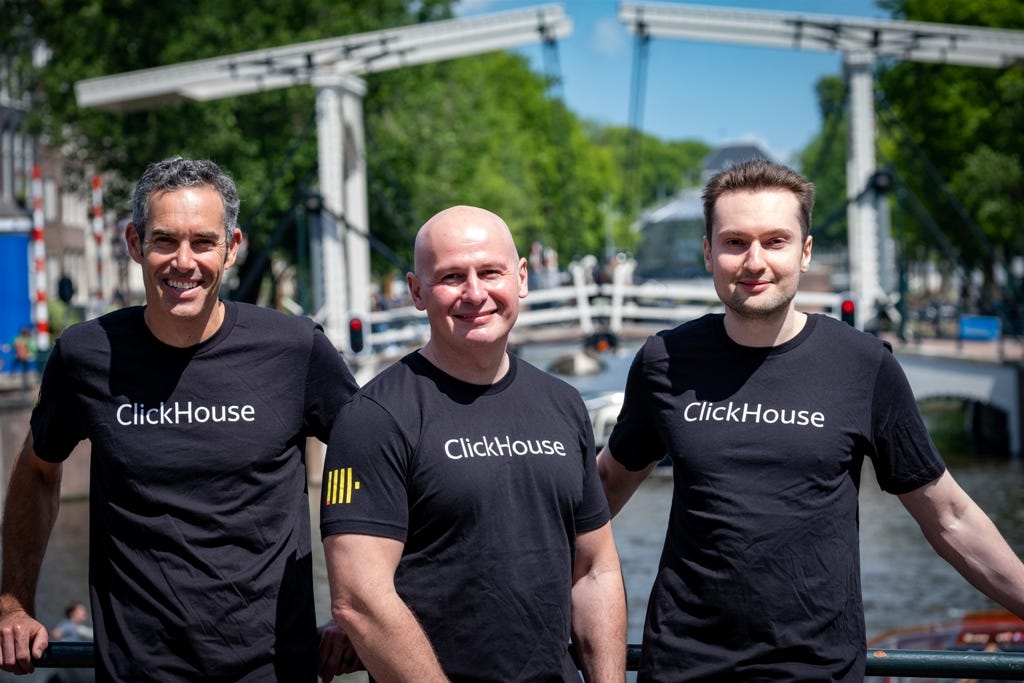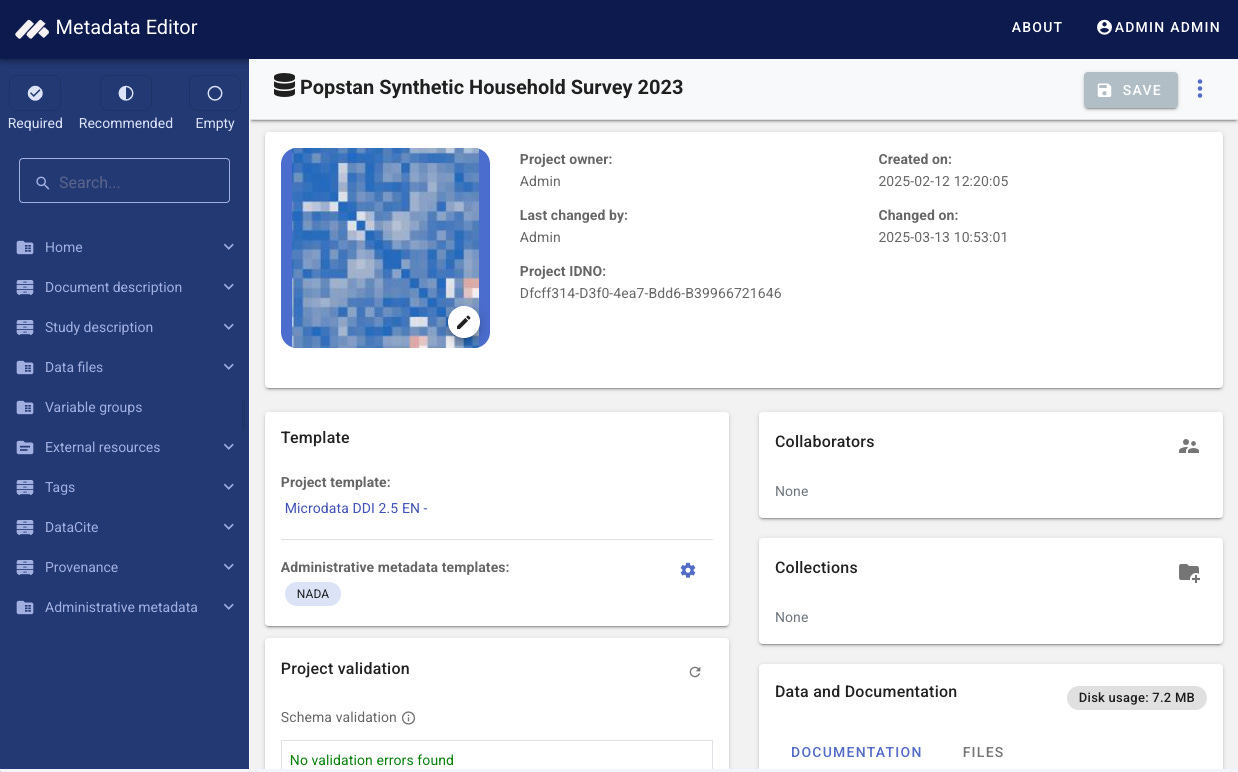Open source database company ClickHouse hits $6.4B valuation
Plus: Snowflake buys Postgres company Crunchy Data + much more.
Databases are in the spotlight again in this week’s edition of Forkable, as ClickHouse raises $350 million at a lofty $6.4 billion valuation, while Snowflake snaps up Crunchy Data, a company building enterprise-grade products atop open source relational database PostgreSQL.
Elsewhere: Apache graduates 2 new projects; a new open source fund announces the first recipients; Godot game engine gets Apple's support; the World Bank releases its first ever open source software; and more.
As usual, feel free to reach out to me with any questions, tips, or suggestions: forkable[at]pm.me.
Paul
Open issue
ClickHouse clicks with investors
ClickHouse, the company behind the eponymous open source database management system that spun out of Yandex four years back, announced this week it has raised $350 million in a Series C round of funding.
The cash injection roughly triples the company’s valuation to $6.4 billion, as per a Bloomberg report this week, and takes its total money raised to north of $650 million.
By way of a brief recap, ClickHouse started out in 2009 as an internal project at Yandex, the technology juggernaut once dubbed the “Google of Russia.” ClickHouse was used initially for real-time analytical reporting to support an in-house web analytics platform called Yandex.Metrica, with the company going on to open-source the project in 2016.
Fast-forward to September 2021, and Yandex spun-out ClickHouse as an independent company headquartered in San Francisco, spearheaded by CEO Aaron Katz; CTO Alexey Milovidov; and president of product and technology Yury Izrailevsky.
ClickHouse has been adopted by a who’s who of tech firms through the years, from Spotify, Microsoft, and Meta, to Uber, HubSpot, and eBay. But with the launch of a hosted cloud product in 2022, the company has gone from strength-to-strength, with the company now claiming an annualized revenue rate (ARR) of nearly $100 million, the company told Bloomberg.
ClickHouse Cloud couldn’t have come at a better time, with the AI revolution that followed driving demand for high-performance, scalable analytics capable of handling massive volumes of real-time data. And with an open source foundation, this promises flexibility, enabling customers to avoid vendor lock-in by switching providers or self-hosting.
It’s a good time to be a database company. A few weeks back, Databricks confirmed it was doling out $1 billion for Neon, a company developing a serverless open source alternative to AWS Aurora Postgres. And earlier this week, Snowflake announced it was paying $250 million for Crunchy Data (more on that below), a company building enterprise-focused products atop open source relational database PostgreSQL.
ClickHouse’s Series C round was led by Khosla Ventures, with participation from Battery Ventures, Benchmark, Bessemer Venture Partners, Bond, Coatue, FirstMark, GIC, Index Ventures, IVP, Lightspeed, and Nebius. (Side note: Nebius is the former holding company of Yandex, read the full story behind all that here).
Read more: ClickHouse raises $350 million Series C to power analytics for the AI era [ClickHouse blog]
Patch notes
Snowflake picks up Postgres company
Snowflake this week announced it was doling out $250 million for Crunchy Data, a U.S. company specializing in enterprise-grade products and services for open source relational database PostgreSQL.
Founded in 2012, Crunchy Data offers various premium PostgreSQL products, including Crunchy Postgres, a production-grade Postgres distribution for enterprises; and Crunchy Postgres for Kubernetes. The company also offers fully-managed services for public clouds.
Snowflake said that the acquisition will power a new fully-managed database service called Snowflake Postgres, built for the most “demanding, mission-critical AI and transactional systems at enterprise scale and with enterprise confidence,” according to the announcement.
Read more: Snowflake to buy database startup Crunchy Data for about $250 million [CNBC]
Apache graduates 2 more projects
Two more Apache projects have graduated from incubation: Gravitino, a metadata federation and unification platform that works across data warehouses, data lakes, lakehouses, and more; and StormCrawler, an SDK for building real-time web crawlers, built atop Apache Storm.
As official top-level projects, Gravitino and StormCrawler are in good company alongside some 300 other projects.
Read more: The Apache Software Foundation Announces Two New Top-Level Projects [Press release]
FLOSS like a boss
Back in October, Indian financial services company Zerodha announced a new funding initiative called FLOSS/fund, which pledges $1 million annually to open source projects. The reason? “A significant portion of our success and growth is owed to FOSS [free and open source software],” Zerodha CTO Kailash Nadh said at the time.
In the intervening months, Zerodha said it received applications from more than “300 projects and entities,” requesting $6 million in funding.
Last week, Zerodha announced the first 9 recipients, which will receive $325,000 across the board. The biggest winner is OpenSSL Library, an open source toolkit for general-purpose cryptography and secure communication, which receives $100,000 of the distribution.
Open source project maintainers can apply for future funding here.
Read more: FLOSS/fund first tranche: $325k to 9 projects [FLOSS.fund blog]
Godot gets Apple’s support
Game engine Godot is gaining native support for VisionOS, Apple’s mixed reality operating system.
Godot, for the uninitiated, is the fast-growing open source game engine taking on the the likes of Unity and Unreal Engine. Game engines serve the building blocks for developers to create games, packing everything from graphics renderers to scripting and memory management.
With the latest developer release of the Godot Engine, native support for VisionOS is firmly on the agenda, stemming from an initial pull request (PR) made by an Apple engineer back in April.
This could prove a boon for indie developers looking to make their games available for Apple’s Vision Pro headset without having to jump through hoops, or use third-party plugins.
It’s all about lowering the barrier to entry.
Read more: Godot Engine's native VisionOS support is a potential game-changer for VR developers [Creative Bloq]
World Bank goes open source for metadata
As I reported back in March, the United Nations has been tooting its open source trumpet with the creation of its “8 open source principles,” fully endorsed by the Open Source Initiative (OSI). Now, it’s the turn of another Intergovernmental Organization (IGO) to throw its weight behind open source.
The World Bank, a global financial institution that funds economic development projects to reduce poverty, this week announced its first ever open source software release —Metadata Editor, dubbed a “multi-standard open-source metadata editor.”
Available under a MIT license, Metadata Editor is a lightweight app for structuring and publishing statistical metadata — it’s designed to enhance data quality and usability, helping governmental and research folks organize and share statistical data more clearly and consistently.
As its first open source software release, Metadata Editor signals a new direction for the World Bank “using software not just as a delivery mechanism, but as a public good in its own right.”
“This release marks more than a technical milestone — it reflects a structural shift in how the Bank shares its data and knowledge,” the organization wrote in a blog post a couple of weeks back. “For the first time, there is a clear institutional framework for making Bank-developed software open, reusable, and legally shareable—advancing the Bank’s commitment to public goods, transparency, open science, and long-term development impact.”
Read more: The World Bank’s first open source software release [World Bank Blog]
Optimizing agentic workflows
DataRobot, the enterprise AI development platform last valued at more than $6 billion, this week launched Syftr, an open source framework designed to help companies create more efficient agentic AI workflows — particularly where budgetary and resource constraints are at play.
Syftr does this by automatically finding the best combination of components, parameters, and tools for a given use-case.
Read more: DataRobot launches the first open source framework for performant agentic workflows [press release]
Pocket change
Only a select few apps make it to my phone’s home screen on their own pedestal (i.e. not in a folder) — and read-it-later app Pocket is one of them. It has been my go-to article bookmarking tool for more than a decade, and I was absolutely fine when Mozilla announced in 2017 that it was acquiring Pocket — there were far worse potential outcomes.
Fast-forward eight years, and Mozilla has announced that it’s shuttering Pocket for good on July 8, 2025. So I’m in a bit of a quandary — do I just do a data export over to something like Instapaper, by far the easiest option? Or do I finally go good on a promise I made myself to use open source apps as much as I can?
So that’s where I’m at right now with my Pocket predicament. I’ve been looking into open source, self-hostable options such as Wallabag, while the folks at Android Authority this week alerted me to another alternative called Karakeep.
This is all really just to say that while Pocket will be sorely missed, it’s also a good opportunity to explore something with more of an “open” ethos.
And finally…
Hugging Face hawks humanoids
AI developer platform Hugging Face unveiled two open source humanoid robots this week.
Costing around $3,000, the full-sized “HopeJR” robot has “66 actuated degrees of freedom,” and has the ability to walk and move its arms. The demure, desktop-sized incarnation, “Reachy Mini,” will cost up to $300, and can move its head, talk, listen, and apparently be used to test AI apps!
Hugging Face said that it expects to start shipping the robots by the end of 2025, according to TechCrunch, with a waitlist currently open.
“The important aspect is that these robots are open source, so anyone can assemble, rebuild, [and] understand how they work, and [that they’re] affordable, so that robotics doesn’t get dominated by just a few big players with dangerous black-box systems,” Hugging Face CEO Clem Delangue told TechCrunch.
Read more: Hugging Face unveils two new humanoid robots [TechCrunch]





